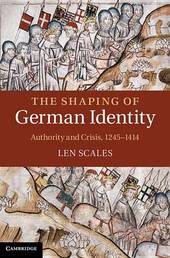
|
The Shaping of German Identity: Authority and Crisis, 1245-1414
Hardback
Main Details
| Title |
The Shaping of German Identity: Authority and Crisis, 1245-1414
|
| Authors and Contributors |
By (author) Len Scales
|
| Physical Properties |
| Format:Hardback | | Pages:636 | | Dimensions(mm): Height 235,Width 158 |
|
| ISBN/Barcode |
9780521573337
|
| Classifications | Dewey:943.02 |
|---|
| Audience | | Professional & Vocational | |
|---|
| Illustrations |
1 Tables, black and white; 4 Maps
|
|
Publishing Details |
| Publisher |
Cambridge University Press
|
| Imprint |
Cambridge University Press
|
| Publication Date |
26 April 2012 |
| Publication Country |
United Kingdom
|
Description
German identity began to take shape in the late Middle Ages during a period of political weakness and fragmentation for the Holy Roman Empire, the monarchy under which most Germans lived. Between the thirteenth and fifteenth centuries, the idea that there existed a single German people, with its own lands, language and character, became increasingly widespread, as was expressed in written works of the period. This book - the first on its subject in any language - poses a challenge to some dominant assumptions of current historical scholarship: that early European nation-making inevitably took place within the developing structures of the institutional state; and that, in the absence of such structural growth, the idea of a German nation was uniquely, radically and fatally retarded. In recounting the formation of German identity in the late Middle Ages, this book offers an important new perspective both on German history and on European nation-making.
Author Biography
Len Scales is a Lecturer in the Department of History at Durham University. He has published widely both on late medieval German history and on the history of peoples and nations in medieval Europe. He is the editor (with Oliver Zimmer) of Power and the Nation in European History (Cambridge, 2005).
Reviews'This is a lucid and incisive analysis of late medieval German identity in its wider European context. Based on an impressive command of the sources, Len Scales argues that the very weakness of monarchy within the Holy Roman Empire accounts for the relative strength of national sentiment. His conclusions transform how we see the origins of modern European nations.' Peter H. Wilson, University of Hull 'In his well investigated and broadly conceived study, Len Scales identifies a burgeoning sense of German identity in those lands directly north of the Alps between the deposition of the Hohenstaufen emperor Frederick II in 1245 and the beginning of the Church Council of Constance in 1414. He draws on a wide range of historical, and to some extent also literary and didactic texts, and certainly confirms the development of an ever growing discourse on Germanness during the late Middle Ages.' Albrecht Classen, University of Arizona 'This eagerly awaited and richly learned book explores the delicate question of German national identity in the later middle ages. With subtlety and clarity, Len Scales shows how the curiosities of Germany's imperial monarchy were no obstacle to the cultivation of national consciousness in this complex and under-studied period; his textured portrayal of German political culture will benefit not only scholars of medieval history but anyone interested in questions of nationhood.' John Watts, University of Oxford 'Scales' book is an exhaustive examination of the rich and varied literature, historical and political writing, and philosophy produced in pre-humanist Germany, a cultural achievement that is still underappreciated by most persons trained in the Anglo-French tradition ... this meticulously researched and highly original study should be read by all scholars of late medieval nationality and statecraft.' D. Nicholas, Mediaevistik 'Scales has brought together an immense amount of material dealing with the topic of German identity in the later medieval period ... this volume will be valuable to specialists and graduate students.' David S. Bachrach, Austrian History Yearbook
|